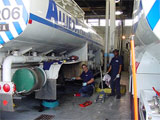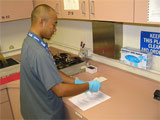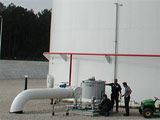HOURLY POSITION DESCRIPTIONS
Lead Fuelers:
 They
perform and assist the Operations Supervisor in all fueling aspects.
They are responsible for overseeing the servicing all type aircraft with
fuel; additionally, automotive and ground support equipment are
serviced. Initial training consists of a five week period of both
classroom and on-the–job instruction. Lead Fuelers are also trained to
handle non-routine situations, such as defueling and fueling aircraft
with inoperative fuel quantity indicators.
They
perform and assist the Operations Supervisor in all fueling aspects.
They are responsible for overseeing the servicing all type aircraft with
fuel; additionally, automotive and ground support equipment are
serviced. Initial training consists of a five week period of both
classroom and on-the–job instruction. Lead Fuelers are also trained to
handle non-routine situations, such as defueling and fueling aircraft
with inoperative fuel quantity indicators.
Fuelers:
 Responsible
for servicing all type aircraft with fuel; additionally, automotive and
ground support equipment are serviced. All fuelers are qualified to fuel
the aircraft of each airline and can work at any terminal or airline.
Fuelers are also trained to handle non-routine situations, such as
defueling and fueling aircraft with inoperative fuel quantity
indicators. In addition, they are responsible for the fueling of ground
equipment, preparation of the fuel tickets and track sheet data all in
accordance by the various airlines.
Responsible
for servicing all type aircraft with fuel; additionally, automotive and
ground support equipment are serviced. All fuelers are qualified to fuel
the aircraft of each airline and can work at any terminal or airline.
Fuelers are also trained to handle non-routine situations, such as
defueling and fueling aircraft with inoperative fuel quantity
indicators. In addition, they are responsible for the fueling of ground
equipment, preparation of the fuel tickets and track sheet data all in
accordance by the various airlines.
Lead Mechanic:
 They
perform and assist the Maintenance Supervisor in all aspects of the
maintenance shop. They are responsible for overseeing, assigning work
and working with the mechanics and utility men.
They
perform and assist the Maintenance Supervisor in all aspects of the
maintenance shop. They are responsible for overseeing, assigning work
and working with the mechanics and utility men.
Mechanic:
 Work
performed includes the repair and maintenance of the to-plane fueling
equipment including daily, monthly, quarterly, semi-annual and annual
inspections. Additionally, he oversees the tank farm maintenance which
includes quality control of fuel receipts, preventive maintenance of the
entire hydrant fuel system, filter changes, Millipore testing, meter
changes, meter calibrations, and periodic maintenance checks associated
with the tanks, pumping and hydrant system. Assist in any flushing of
the fuel system that may need to take place.
Work
performed includes the repair and maintenance of the to-plane fueling
equipment including daily, monthly, quarterly, semi-annual and annual
inspections. Additionally, he oversees the tank farm maintenance which
includes quality control of fuel receipts, preventive maintenance of the
entire hydrant fuel system, filter changes, Millipore testing, meter
changes, meter calibrations, and periodic maintenance checks associated
with the tanks, pumping and hydrant system. Assist in any flushing of
the fuel system that may need to take place.
Lead Tank Farm / Hydrant System Operator:
 Performs
and assists the Fuel Facility Manager in operational duties,
responsibilities and oversight of the Fuel Storage facilities and
pumping systems. Essential duties and responsibilities includes the
following, but not limited to daily coordination, assigning direction,
compliance of work, training and interaction with management staff. The
lead is an extension of the management staff and shall refer to
management on all questionable matters, including non compliance as
directed or disciplinary related matters. At any given period of time,
this person will be able to fill in any gaps that may have occurred on
the fuel facility or hydrant system operations, due to vacation, sick or
overtime requirements. Additional responsibilities and duties may be
assigned as directed by management.
Performs
and assists the Fuel Facility Manager in operational duties,
responsibilities and oversight of the Fuel Storage facilities and
pumping systems. Essential duties and responsibilities includes the
following, but not limited to daily coordination, assigning direction,
compliance of work, training and interaction with management staff. The
lead is an extension of the management staff and shall refer to
management on all questionable matters, including non compliance as
directed or disciplinary related matters. At any given period of time,
this person will be able to fill in any gaps that may have occurred on
the fuel facility or hydrant system operations, due to vacation, sick or
overtime requirements. Additional responsibilities and duties may be
assigned as directed by management.
Tank Farm / Hydrant System Operators:
 Essential
duties and responsibilities includes the following, but not limited to:
responsible for the receiving and dispatching of jet fuel via pipeline
and/or tanker truck, take samples and perform tests on product for
quality control and perform inspections. In addition, they are to
perform routine and periodic inspections with compliance with company,
government, and industry standards, transfer product and monitor storage
tanks, pipelines, and related equipment to ensure that they are in good
working order to prevent spills, releases, and product contamination.
They are required to log entries of fuel transactions, quality control,
and maintenance and perform all required tasks in a safety conscious
manner, incorporating all aspects of the corporate and local facilities
safety training program. Per shift, one person will be dedicated to
ensure that the hydrant system is operating above and beyond status quo.
Essential
duties and responsibilities includes the following, but not limited to:
responsible for the receiving and dispatching of jet fuel via pipeline
and/or tanker truck, take samples and perform tests on product for
quality control and perform inspections. In addition, they are to
perform routine and periodic inspections with compliance with company,
government, and industry standards, transfer product and monitor storage
tanks, pipelines, and related equipment to ensure that they are in good
working order to prevent spills, releases, and product contamination.
They are required to log entries of fuel transactions, quality control,
and maintenance and perform all required tasks in a safety conscious
manner, incorporating all aspects of the corporate and local facilities
safety training program. Per shift, one person will be dedicated to
ensure that the hydrant system is operating above and beyond status quo.
Lead Utility/Utility:
These individuals are an offshoot of the Lead Mechanics and their
responsibilities are to keep the overall facility looking like new.
Their duties include but are not limited to janitorial services, general
repair and maintenance of the facility, spill clean-up services, sumping
of the pits and equipment prior to fueling, and various other tasks that
management may see fit.





